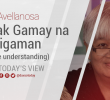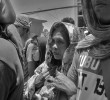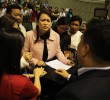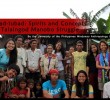By the Policy Study, Publication and Advocacy (PSPA)
Center for People Empowerment in Governance
MANILA — Not since the snap presidential elections of 1986 have Philippine elections attracted a big number of international observers as this week’s polls. The May 14 mid-term elections were witnessed throughout the country by about 250 foreign observers coming from 24 countries. More than a third of them came from the United States, which sent 81 observers.
A number of them have observed elections in Afghanistan, Iraq, East Timor and other countries torn by armed conflicts or classified as “emerging democracies.”
Aside from the U.S., countries represented by the foreign observers included Canada (North America); the United Kingdom (Britain and Scotland), France, Germany, Norway, The Netherlands, Sweden, Finland, Spain, Belgium, Denmark (Europe); Australia, New Zealand, Japan, Singapore, Myanmar, South Korea, Pakistan, India, Indonesia, Malaysia (Asia and Oceania); Colombia and Venezuela (Latin America).
The foreign observers came in groups some of which have monitored elections in several countries including flashpoints as Iraq, Afghanistan, East Timor, Kampuchea, Liberia, Nepal and even the U.S. for the past several years. Among the groups are the European Commission, the USAID, National Democratic Institute (NDI), the International Foundation for Election Systems (IFES), Asia Foundation, Friedrich Naumann, the People’s International Observers Mission (P-IOM) and the Compact for Clean and Honest Elections (Compact). This week, they monitored elections in many provinces including “hot spots” in Northern and Central Luzon, Southern Luzon particularly the Bicol region, Western and Central Visayas and Mindanao provinces such as Compostela Valley, Lanao del Sur, Maguindanao and Sharif Kabungsuan.
Reports reaching the Center for People Empowerment in Governance (CenPEG) show foreign observers witnessing incidents of cheating, voters’ disenfranchisement and other election violations. Members of the P-IOM told reporters of being stopped and interrogated at military checkpoints in Nueva Ecija, Cebu and other provinces.
The interest in the Philippine elections can be attributed to perceptions in many foreign countries about the rigged elections in 2004 which precipitated two impeachment complaints against the incumbent President, Gloria M. Arroyo, and widespread calls for her resignation. Political instabilities were further fueled by charges of human rights violations against the President over unmitigated extra-judicial killings and forced disappearances the latest victim of which is Jonas Burgos, son of press freedom icon, Jose Burgos, Jr. The politically-motivated killings have drawn the concerns of the United Nations Human Rights Council (UNHRC), U.S. Congress, European Parliament, European Union, the Inter-Parliamentary Union, several foreign governments as well as international rights watchdogs and church and faith communities.
Although the objective of foreign monitoring of elections in many countries is to find out whether polls are conducted “fairly and democratically” and hence ensure people’s participation in public governance, foreign monitoring missions have a range of other agenda in mind. The observers in this week’s elections have quite a broad array of background and profiles: Among them are diplomatic officials, parliamentarians and members of political parties, and think tanks. There are also lawyers, educators, journalists, civil libertarians, human rights advocates, and artists.
Foreign observers sent by embassies or grouped under institutions funded by their own governments are usually more concerned with using the elections as a yardstick for mapping out a political and risk analysis of the country. Elections provide them a lens through which they can measure how stable the country’s political institutions including government leadership are. Others have the immediate concerns about future economic opportunities in the Philippines � or lack of it � that the electoral exercise will be able to offer. How the elections open a democratic space for the poor through their party-list groups to push for social and economic reform is also another concern.
One of the active observers but is keeping a low profile in the elections is the National Democratic Institute (NDI), a quasi-government agency of the U.S. government. NDI’s headquarters is in Washington, DC and has field offices in some 70 countries. It conducts democratic development programs in some 112 countries including Iraq, Afghanistan, Bosnia-Herzegovina, Kosovo, Ukraine, Myanmar, East Timor, El Salvador, Mozambique, Uganda, Indonesia, Nepal, Venezuela, Colombia, and the Philippines.
In the Philippines, NDI started a program in 2003 “to help promote democratic governance” in the Autonomous Region of Muslim Mindanao (ARMM) where it also collaborates with local government units, Municipal Peace and Order Councils and the Philippine National Police on public safety issues.
NDI, which is believed to be associated with the Democratic Party in the U.S., has Madeleine Albright. former U.S. Secretary of State, as its Board chair. The institute was created by the U.S. government through the National Endowment for Democracy (NED), said to be a semi-government arm of the U.S. state department with funds sourced from the USAID. Created by President Ronald Reagan in 1982, the NED has been cited as either interfering in the affairs of other countries or funding candidates who support pro-U.S. corporations and have strong ties with the military. Often quoted is a statement by Allen Weinstein, who helped establish the NED, in a 1991 interview with the Washington Post: “A lot of what we do today [at the NED] was done covertly 25 years ago by the CIA.”
The International Foundation for Election Systems (IFES), which is also based in Washington, DC, claims to be the world’s leading election assistance organization. Founded in 1987, IFES has worked in more than 100 countries including in the Philippines where it assists the Commission on Elections (Comelec) in its modernization program, electoral law reform, voters education and provides sub-grants to local NGOs engaged in electoral reform.
IFES has bilateral and multilateral funders that include the USAID, state governments in the U.S., as well as AusAID, CIDA (Canada), DFID (United Kingdom), JICA (Japan), the Norwegian Royal Ministry of Foreign Affairs, SIDA (Sweden), the Netherlands Institute for Multiparty Democracy (NIMD), UNDP, and several others.
The European Commission (EC) is the executive branch or the “public service” of the European Union (EU). The EC represents the EU in 120 countries including the Philippines. The EC Delegation, which is a fully-fledged diplomatic mission, was opened in the Philippines in 1991 to coordinate official development assistance (ODA) from EU countries.
The foreign observers’ missions were fielded on election day and a couple of days after that. One of the groups, the P-IOM, is set to release its findings on the elections to the media on May 18 with the rest of the groups doing the same thing within the week.
Yet to be ascertained is whether the reports will cover pre-election accounts about secret operations conducted by pro-government operators designed to rig the polls and the post-election canvassing particularly in the Visayas and Mindanao where reports of vote-padding and �shaving and other types of cheating are ongoing. For their reports to be useful, an in-depth investigation of the fraud machinery that has remained in place since 2004 and blatant fraud incidents particularly in southern Philippines is in order.
CenPEG is a public policy center set up shortly before the May 2004 elections to help promote people empowerment in governance and democratic representation of the marginalized poor in an elitist and patronage-driven electoral and political system. It conducts research/policy study, education and trainings on governance and people empowerment. To pursue its programs in research and education-training, CenPEG taps a wide pool of political analysts, public policy experts and academic scholars for their expertise and experience in public governance as well as in grassroots empowerment.
2007 Elections
![[STANDPOINT] Illegal drugs and the NIMBY mindset](https://davaotoday.com/wp-content/uploads/2016/09/Mags-Maglana_UPMIN-Sept.-20-110x100.jpg)








